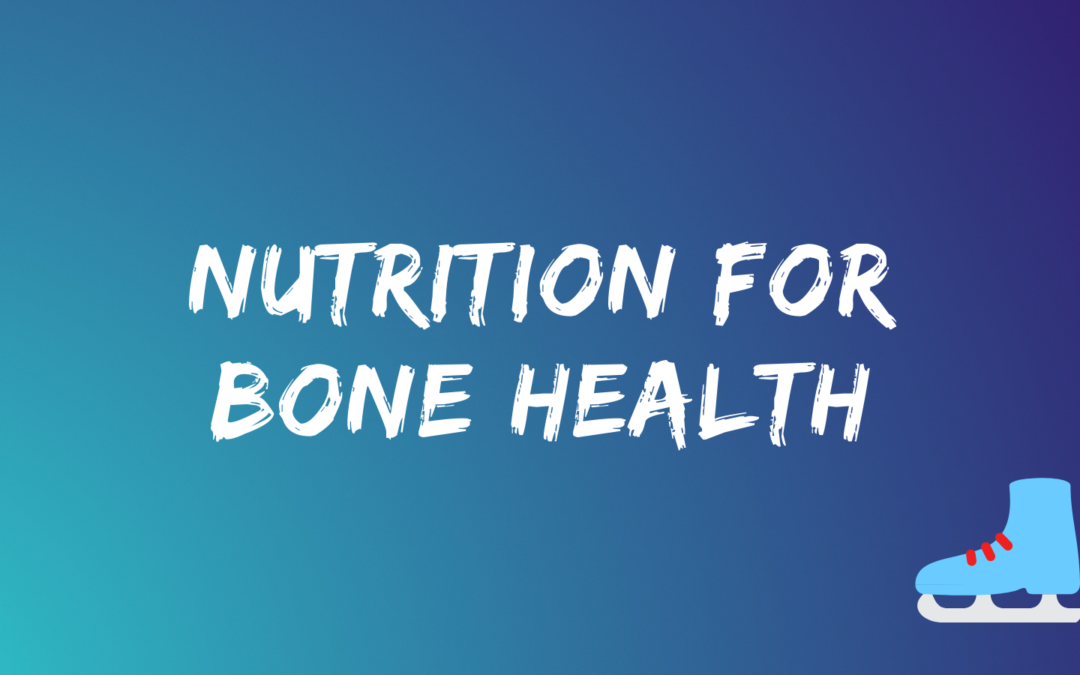Performance & recovery nutrition, participating in sports such as hockey, and sleep all go hand in hand in supporting optimal bone health in female athletes. A balanced, nutrient-rich diet is vital to lowering fracture and injury risk. Healthy eating with balanced caloric intake to meet the energy demands of sports such as hockey during adolescence is extremely important for strong bones and preventing the early onset of osteoporosis.
Red-S syndrome is Relative Energy Deficiency in Sports, which is formerly known as the Female Athlete Triad. Red-S happens when an athlete does not have enough calories to meet their body’s energy expenditure. Actively participating in sports requires extra energy demands of the body, which requires increased energy intake from food. The energy deficiency could then result in impairments of metabolism, amenorrhea, low estrogen, and then ultimately decreased bone health and increased bone fracture risk. Therefore, optimal nutrient intake reduces the risk of stress fractures. Peak bone mass attained during adolescence is an essential factor that decreases the probability of osteoporosis and bone health issues in the future. Therefore, young female athletes need to focus on obtaining a balanced diet for both top sports performance and overall health and wellness for now and for later in life.
Below are top nutrition & wellness tips for optimal bone health:
Bone Health Nutrition Tips:
- Choose calcium-rich foods: milk (dairy & non-dairy), yogurt, cheese, tofu, almonds, chickpeas, broccoli, kale, okra, fortified OJ
- Choose vitamin D rich foods: milk (dairy & non-dairy), eggs, yogurt, fortified OJ, fish (herring, salmon), cod liver oil, mushrooms
- Eat foods rich in vitamin C: pineapple, papaya, tomatoes, oranges, strawberries, blueberries, cranberries, bell peppers, broccoli, cantaloupe, kiwi, lemon, kale, brussels sprouts, cauliflower, cabbage, grapefruit
- Consume vitamin K rich foods: kale, collard greens, broccoli, green beans, spinach, avocado, kiwi, cabbage
- Include potassium-rich foods: potatoes, bananas, avocado, beans, lentils, and milk
- Eat magnesium-rich foods: almonds, spinach, peanuts, whole-grain cereal, beans, edamame, peanut butter, avocado, yogurt, brown rice, banana, potatoes
- Choose foods rich in phosphorus: chicken, shrimp, salmon, tuna, lentils, tempeh, soybeans, nuts, yogurt, milk, nuts, sunflower seeds, pumpkin seeds, eggs
- Aim for a colorful plate that includes a variety of fruits and vegetables to ingest vitamins and minerals vital to building bone
- Meet your body’s caloric energy needs: fuel your body every 2 to 4 hours and aim for equal energy balance
- Include all three macronutrients (1. carbs –grains & fruit, 2. protein, 3. fat) each time you eat
- Meet protein needs by consuming protein sources at all meals and snacks such as poultry, lean meat, fish, milk, eggs, beans, lentils, tofu, tempeh, nuts, nut butter, seeds, yogurt, cheese, and protein shakes
- Avoid alcohol, soda, smoking, which all negatively impact bone health
- Replace soda with water, vegetable juice, and calcium-rich beverages such as dairy milk, non-dairy milk (soymilk, almond milk, coconut milk, oat milk), protein shakes, and calcium-fortified orange juice
- Follow a Mediterranean diet, rich in fruits, veggies, whole grains, legumes, nuts, fish, and olive oil to enhance bone health
- Always have a protein shake within 30 min after hockey to promote recovery
Bone Health Exercise Tips:
- Include daily activity
- Aim to include both low impact and high impact exercise such as hockey, jogging, brisk walking, stair climbing, racquet sports, cycling, swimming, and dancing
- play multiple sports
- Include strength training
- Incorporate balance and flexibility training such as yoga
Bone Health Sleep Tips:
- Get plenty of sleep
- Aim to get 8 to 10 hours of sleep daily
- Sleep is the time the body rebuilds, recovers, and heals
- On intense practice & training days as well as games, aim to include a protein-rich snack before bed such as Greek yogurt, cottage cheese, or a protein smoothie
…
This article is written by Tara Ostrowe, MS, RD, CSSD, a sports dietitian based in Manhattan & NJ. Tara has her undergraduate degree in dietetics & nutrition from the University of Wisconsin and her master’s degree in Nutrition & Exercise Physiology from Columbia University. She is also board-certified in sports nutrition. Her current & past experiences include providing sports nutrition to the New York Red Bulls, New York Football Giants, NJ Devils, NJ Jets Youth Hockey, AS Monaco FC, Monaco Basketball, Columbia Athletics, Wisconsin Athletics, and LIU Brooklyn Athletics.
